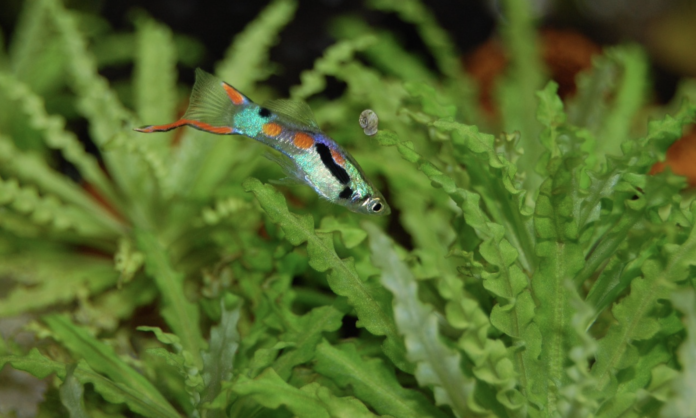Last Updated on February 3, 2024 by Fumipets
How to Care for Guppies: 6 Things You Should Know
How to Care for Guppies
Fish are relatively easy creatures to care for, making them a great low-maintenance or introductory pet. However, some types of fish are more high-maintenance than others.
Guppies are a fun beginner fish to add to an aquarium setup with bright colors and fan-shaped tails. Here’s how to care for guppies and what you should know about their unique needs.
Add Water for Each Guppy
Guppies are small fish that can thrive in a smaller tank. While these aquatic creatures are social, they do require additional space when introducing friends. According to the experts at Fishkeeping World, you should provide a five-gallon tank for a single guppy. Then, add a gallon of water for each additional adult guppy added to the tank.
Guppies are used to living in wide-open water systems with plenty of enrichment and places to hide. Allowing space to roam will keep your guppies happy and give them room to engage and retreat.
Add a Bubbler
Guppies thrive in water continuously in motion, similar to their natural habitats. They require a strong supply of oxygenated water to survive. If you plan on creating a habitat for guppies, purchasing a bubbler is a must. Don’t be surprised if you find your guppies hanging out around the bubbler; this is common behavior.
Monitor the Temperature
Temperature control is also important for keeping guppies safe and healthy. Variations of a few degrees can make them more susceptible to illness and disease. Temperatures should stay within the 74–82ºF range.
If you live in an area prone to extreme temperatures, it’s worth investing in a heater. If you notice the temperature rising, you can use an ice float under supervision to cool it down (don’t put ice directly into the tank).
Watch for Common Illnesses
Your guppy is at low risk for developing an illness with proper care. However, accidents happen, and, as the saying goes, life finds a way. Guppy disease is caused by the protozoan parasite, which invades when the water quality or temperature is too low. If you notice your guppy struggling to breathe or lacking an appetite, check the water temperature and quality to correct the illness.
Ich is another parasite that’s recognizable by the white spots it will leave on your fishy friends. Quarantine your infected fish, increase the water temperature, and add a tablespoon of salt to kill the parasite.
Pair with Other Guppies
Guppies are social fish that get along with many different breeds. However, they prefer the company of other guppies. If you’re planning on adding other fish to your aquarium, start with a few more guppies first. Then, diversify and add some new (friendly) neighbors.
Provide a Diverse Diet
Your guppy will survive on basic fish flakes, but they’ll thrive with a diverse diet that replicates their natural habitat. Supplement their diet with algae wafers if your tank doesn’t have many natural algae, and add some freeze-dried blood worms for extra flavor.
Taking care of guppies isn’t difficult, but it takes care and attention to improve their quality of life. With these practical tips, you can provide an engaging, clean environment for your fish friends.


















